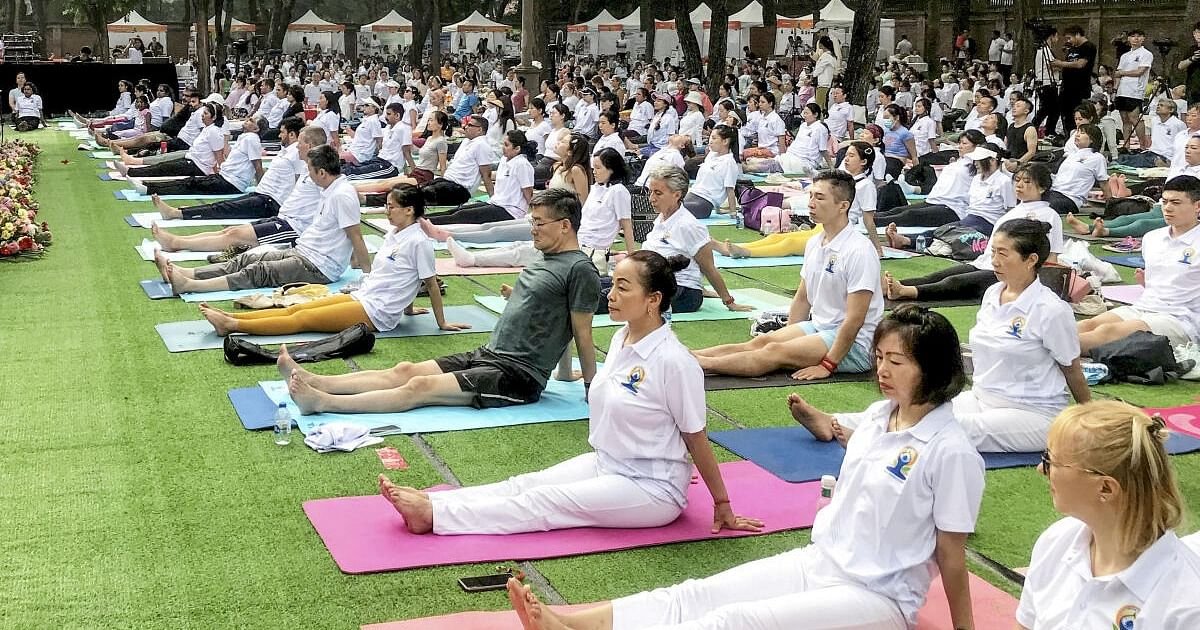BEIJING: Hundreds of yoga enthusiasts across China rolled out their mats on Saturday to showcase their passion and skill for the ancient Indian physical and spiritual practice, marking the 10th International Day of Yoga despite a frost in relations between the two countries since military clashes in the eastern region of Ladakh in 2020.
Officials said the number of yoga practitioners, especially young people, taking part in formal and informal events organised in different cities on International Yoga Day has been increasing every year.
More than 1,000 yoga enthusiasts participated in a two-hour program organised by the Indian Embassy in Beijing on Saturday. The event was organised to coincide with the US holiday weekend, a day after International Yoga Day.
Indian Ambassador to China Pradeep Kumar Rawat, his wife Shruti Rawat, Deputy Ambassador Abhishek Shukla and embassy staff participated in the special event held at the old embassy premises along with a large number of yoga practitioners.
The event featured various aspects of Indian health and wellness traditions, including a common yoga protocol led by the Embassy’s Indian Cultural Teacher, Lokesh Sharma, as well as a special meditation session led by eminent professor and meditation expert, Dr RS Bhogal, of the Kaivalyadama Yoga Institute, Pune.
The event was organised in collaboration with four organisations – YogiYoga, We Yoga, Om Shiva Yoga and Hemanth Yoga.
The session also featured a challenge for the participants, with enthusiastic participants attempting ‘Ashtavakrasana’ (octagonal pose) and prizes were given to the winners at the end of the event, said TS Vivekanand, First Secretary, Cultural Affairs, Embassy of India. PTI.
Participants were diligently engaged in the Common Yoga Protocol, a standardised yoga practice that covers all aspects of yoga and is suitable for all age groups, Vivekananda said. Advanced yoga sessions and yoga challenges were also organised for those who practise yoga regularly, he said.
The event featured a heartfelt kirtan performance by NK Singh and a mesmerising Kathak performance by Sohini Karanth, which blended elements of yoga and meditation.
Massive yoga events were held at Indian consulates in Shanghai and Guangzhou, as well as in the eastern city of Yiwu, a global commodity market that is home to hundreds of Indian businessmen and exports billions of dollars’ worth of Chinese goods to India.
Vivekanand said there has been growing interest from Chinese participants in yoga events organised by the embassy.
Last year, over 270 people participated in the International Yoga Day, while this year, around 1,000 people took part.
Similarly, the Vasant Mela event organised by the Embassy in March this year attracted over 4,500 participants, highlighting growing interest in Indian culture, food and yoga.
Officials see the rise in attendance at the event as a positive sign despite tensions between the two countries over the eastern Ladakh standoff over the past four years.
Meanwhile, veteran Chinese yoga instructors say there is a qualitative difference in the popularity of yoga in China compared to other countries.
Mohan Bhandari, research director at the Yogi Yoga Institute, said a unique feature of China’s yoga culture is its popularity among young people aged between 20 and 25.
While many people in other countries only become interested in Indian physical and spiritual practices after they turn 30, young people in India are taking up yoga in large numbers.
Bhandari, who is originally from Rishikesh, India, founded the Yogi Yoga Institute a few years ago with his Chinese wife, Ying Yang.
The institute has centers in several cities in China and runs training programs including yoga healing.
Young people who have already taken up yoga are teaching yoga to children in China, and as a result, the next generation of yoga teachers will come from China, Bhandari said. PTI.
Ying Yang, founder and chairman of Yogi Yoga, said yoga will continue to develop in China due to people’s needs and its growing popularity in social life, workplace and family.
But despite yoga’s growing popularity, it has been hit hard during the COVID-19 pandemic, with hundreds of yoga classes closing.
“This has led to many Indian yoga teachers in China returning home to India. The industry in China is slowly recovering and Chinese enthusiasm will continue to drive its growth,” Bhandari said.
Published June 22, 2024 09:57 IST

